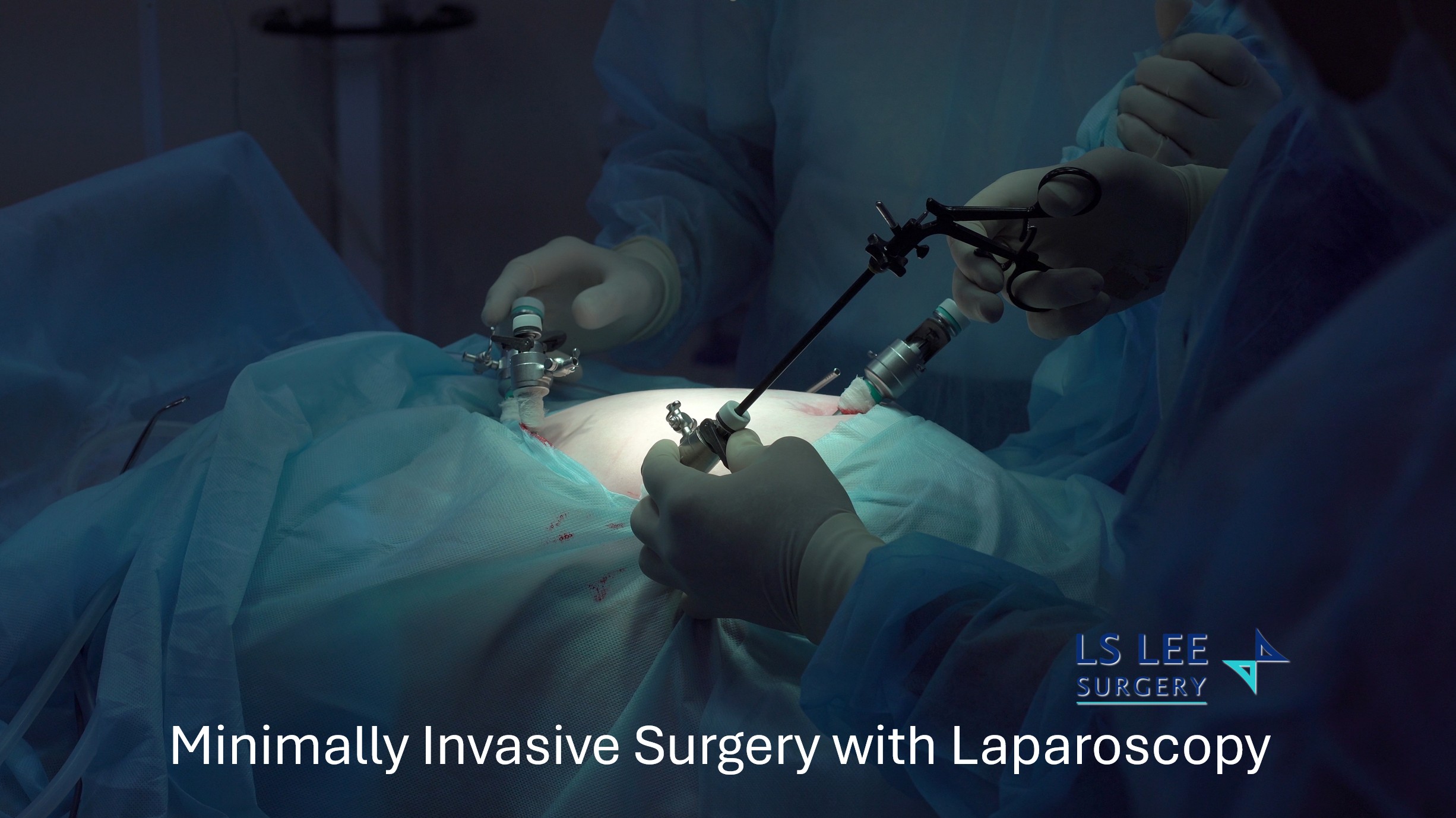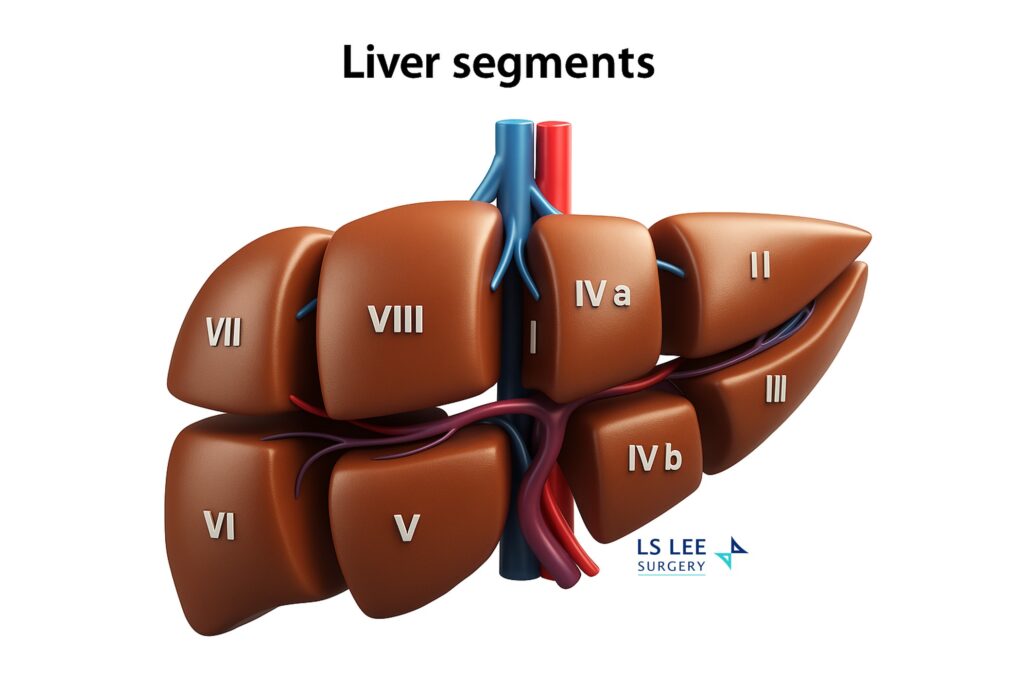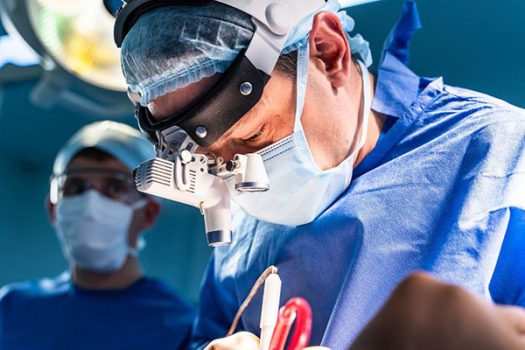Liver Resection with Minimally Invasive Surgery
Liver resection (hepatectomy) is a surgery to remove part of the liver. When suitable, minimally invasive approaches—laparoscopic or robotic—allow the operation to be performed through small incisions using a camera and specialised instruments. These techniques may reduce pain and shorten hospital stay while achieving the same goal: safely removing diseased liver tissue.

Who may benefit from liver resection
- Primary liver cancer (e.g., hepatocellular carcinoma)
- Secondary (metastatic) liver tumours
- Benign liver growths (e.g., hepatic adenomas, large or symptomatic cysts)
- Selected cases of localised trauma or damaged liver tissue
Not everyone is a candidate for surgery. Suitability depends on tumour size and location, overall liver function, and general health.
Types of liver resection
The liver is organised into eight anatomical segments, each with its own blood supply and bile ducts. Surgeons plan resection by segment(s):
- Minor resection: removal of 1–2 segments
- Major resection: removal of ≥3 segments
The liver can regenerate if the remaining tissue is healthy, which is why substantial portions can sometimes be removed safely.

Types of liver resection
Minimally invasive liver resection (laparoscopic or robotic) is performed through several small incisions. Potential advantages compared with open surgery include:
- Smaller wounds and generally less postoperative pain
- Faster recovery and earlier return to daily activities
- Shorter hospital stay in suitable cases
- Lower wound‑related complications and improved cosmetic appearance
(Our team will advise whether a minimally invasive approach is appropriate. In some situations, conversion to an open operation is the safest option.)
Pre operative evaluation
To plan surgery and assess fitness, Our care team may arrange:
- Blood tests to assess liver function and overall health
- Imaging such as contrast‑enhanced CT or MRI to map the liver and nearby vessels
- Occasionally, a liver biopsy to confirm the diagnosis
How liver resection is performed (minimally invasive)
- Anaesthesia keeps you comfortable and pain‑free.
- Small incisions are made for the camera and instruments (laparoscopic or robotic‑assisted).
- Control of blood flow to the targeted segment(s) helps reduce bleeding.
- Precision removal of the affected liver segment(s), preserving healthy tissue.
- Closure of the small incisions with sutures or adhesive strips.
The operation length varies with complexity. If needed for safety, the surgeon may convert to an open incision.
Recovery and aftercare
- It is common to feel some abdominal discomfort and fatigue initially.
- Diet is reintroduced gradually; walking is encouraged early.
- Many patients go home within a few days after minimally invasive surgery. Full recovery may take weeks and differs by individual.
- You’ll receive guidance on wound care, activity restrictions (e.g., avoid heavy lifting for a period), driving, work, and follow‑up visits.
Risks and possible complications
All surgery carries risks. For liver resection, these can include bleeding, infection, bile leakage, and temporary liver dysfunction. Your surgeon will discuss your personalised risk profile and steps taken to reduce risk.
Combined and alternative treatments
Liver surgery may be part of a broader plan that can include:
- Systemic or targeted chemotherapy
- Ablation (e.g., radiofrequency ablation)
- Transarterial chemoembolisation (TACE) in selected cases
- Radiation therapy where appropriate
Our multidisciplinary team will tailor recommendations to your condition and goals.
Combined and alternative treatments
Is minimally invasive liver surgery safe?
In suitable patients and experienced hands, outcomes can be comparable to open surgery. Our team will assess candidacy carefully and prioritise safety.
How do surgeons decide between laparoscopic, robotic, or open surgery?
Choice depends on tumour location/size, prior surgery, liver function, body habitus, and available expertise and equipment.
How long is the hospital stay?
This varies. Many patients having minimally invasive procedures are discharged in a few days if recovery is smooth.
Will my liver grow back?
The liver has a strong ability to regenerate. The extent and speed of regeneration depend on how much is removed and the health of the remaining liver.
When can I return to work and exercise?
Light activity is encouraged early. Timing for work and sports depends on your recovery and job demands—Our team will advise you individually.
Appointments
If you’ve been advised to consider liver resection or want a specialist opinion, please contact our clinic to arrange an appointment. We will review your scans, medical history, and discuss suitable treatment options.







